Book contents
- Saving Nature Under Socialism
- New Studies in European History
- Saving Nature Under Socialism
- Copyright page
- Dedication
- Contents
- Figures
- Acknowledgments
- Abbreviations
- Introduction
- Chapter 1 Balancing Economy and Ecology: Building toward Environmental Protection, 1945–1970
- Chapter 2 “Socialist Environmentalism”: Between Ideal and Practice, 1971–1982
- Chapter 3 Church, Faith, and Nature: An Alternative Environmentalism, 1972–1983
- Chapter 4 Intertwining Environmentalisms: Transboundary Pollution and Protest in Central Europe
- Chapter 5 Coming Out From Behind the Cloud: Environmentalism after Chernobyl
- Chapter 6 Growing Together? The Environment in the Collapse of Communism
- Conclusion
- Bibliography
- Index
Chapter 3 - Church, Faith, and Nature: An Alternative Environmentalism, 1972–1983
Published online by Cambridge University Press: 30 August 2021
- Saving Nature Under Socialism
- New Studies in European History
- Saving Nature Under Socialism
- Copyright page
- Dedication
- Contents
- Figures
- Acknowledgments
- Abbreviations
- Introduction
- Chapter 1 Balancing Economy and Ecology: Building toward Environmental Protection, 1945–1970
- Chapter 2 “Socialist Environmentalism”: Between Ideal and Practice, 1971–1982
- Chapter 3 Church, Faith, and Nature: An Alternative Environmentalism, 1972–1983
- Chapter 4 Intertwining Environmentalisms: Transboundary Pollution and Protest in Central Europe
- Chapter 5 Coming Out From Behind the Cloud: Environmentalism after Chernobyl
- Chapter 6 Growing Together? The Environment in the Collapse of Communism
- Conclusion
- Bibliography
- Index
Summary
Chapter three analyzes how non-party or state actors countered official environmental claims, developed alternative narratives, and challenged authority. In the GDR, Church-based environmentalism evolved on the fringes of society and in a transnational context. Environmental engagement, its impetuses, and its forms led to a critique with theological underpinnings as well as practical frustration about degradation. Church-based activists fostered contacts with independent actors to the east and west, establishing networks across central Europe. In the FRG, the environmental movement became formalized in the Green Party, which underscored the SED’s inability to adapt. In the Soviet bloc, Poland modeled a less repressive attitude toward society that opened opportunities for independent actors, especially Solidarność, which the SED feared would undermine the entire bloc’s security. The SED increasingly distrusted neighboring countries and the potential impact of their reforms at home. The GDR’s position as hinge between east and west became a liability for domestic stability.
Keywords
- Type
- Chapter
- Information
- Saving Nature Under SocialismTransnational Environmentalism in East Germany, 1968 – 1990, pp. 91 - 128Publisher: Cambridge University PressPrint publication year: 2021

